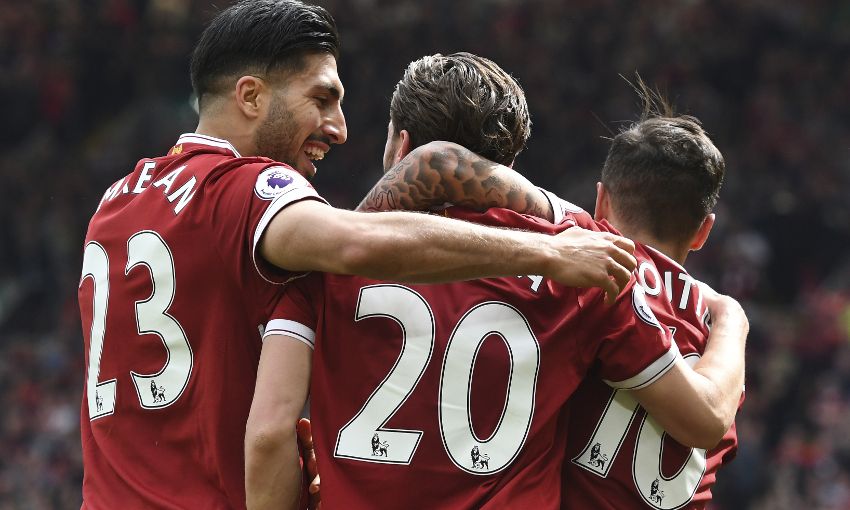'Being in Europe is vital for LFC - they have been missed'
The benefits of Liverpool being back in European competition next season cannot be overstated.
So says Gary McAllister, who knows from personal experience how progress on the continental stage can influence all areas of the club, from recruitment to stature, domestic form to future success.
He was, of course, part of the Reds side that scooped up a treble of trophies during the 2000-01 campaign – including the UEFA Cup – while simultaneously winning the race for a place in the Premier League top three that brought with it Champions League qualification.
The current crop emulated the latter feat last week, with the 3-0 Anfield win over Middlesbrough cementing fourth position and setting up an August play-off to reach the last 32 of Europe’s elite club competition.
If Jürgen Klopp’s team can successfully navigate that two-legged tie, the knock-on effects are significant according to McAllister.
“It’s vital,” the Scot, who played 87 games for the Reds between 2000 and 2002, tells Liverpoolfc.com.
“The club missed the European challenge and I also think it’s so important for recruitment for the manager. Attracting players to the club with European football makes life a lot easier.
“For me, the major European competition has missed Liverpool as well – the nights at Anfield are pretty special and just the name Liverpool is associated with European victories.
“From a personal point of view, it gave you a barometer of where you were as a player individually, because you’re up against the very best. In that level of competition you’re playing against top players from all over the world. That’s what I took from it.
“But for the club, just for the whole progression of any football club to be seen worldwide – it’s such a global game – and to be seen in the top European competition, I think it’s vital for any big club.”
Klopp’s side were beaten in two finals during his opening season at the helm, edged out on penalties by Manchester City in the League Cup before losing against Sevilla in the Europa League showpiece.
Lifting silverware again soon is important, acknowledges McAllister, and the 52-year-old has seen enough already to suspect that the first trophy under the current manager would not be the last.
“With my whole experience of Liverpool Football Club – being there as a player and obviously I spent most of my time playing against Liverpool – I look at Liverpool as a team that needs to win cups,” he continues.
“They’ve got a great history and tradition of winning at home and abroad. Just for the sake of the club and the fans. The fans demand it, the expectation level is high and the day Liverpool Football Club loses that, that’s the day they’ll be in trouble.
“I think that high expectation is a good thing – it’s driving players to win trophies. It’s just crucial for Liverpool to be in the hunt for all the major competitions.
“As far as importance goes, people tend to say the League Cup is the least important. I don’t see it as that. In that period, 2000-01, it gave us such a big confidence boost winning that first one.
“Then from there we just grew. When we got close to the finals of the other two, you get that habit of winning. To relate that to the present-day squad, they’ve had a taste of two cup finals; it’s not gone well for them in those two cup finals, unfortunately they lost both. But they’ll learn from that.
“Just getting over that hurdle of winning one, the club, the group of players and the management team have got the potential to go on and win more.”
Liverpool saw out the season in a different manner to the exhilarating performances that had hinted at a possible challenge for the Premier League title last autumn.
The free-scoring Reds of the first half of the campaign adapted their game by tightening up, particularly away from home, to ensure they could amass the points they needed in the face of a late surge towards the top four by Arsenal.
Klopp and his players will carry lessons from this season through to the next, explains McAllister, as they collectively evolve.
“The problem that they’ve got is a good problem,” adds the former midfielder.
“The problem has been that we’ve been able to deal with the top-six clubs and the problem of dispatching the teams from the bottom half of the table has been more difficult because of the fact that they’ve actually come and parked not one bus, but two buses.
“The learning curve from that is to be patient. There have been signs – the Stoke away game, the West Brom away game, we ground out a dull game 1-0 and came back from 1-0 to win 2-1 against Stoke.
“That’s the big learning curve – that Liverpool don’t have to entertain and play fantastic football every game. There are games where you’ve just got to grind it out.
“Look at Chelsea this season as well, they’ve not played pretty football entirely right through the season. The teams that win leagues have this ability to grind out results against the lesser teams, where it’s been tough to break down defences and teams have defended with numbers. I think that’s the big learning thing.”



